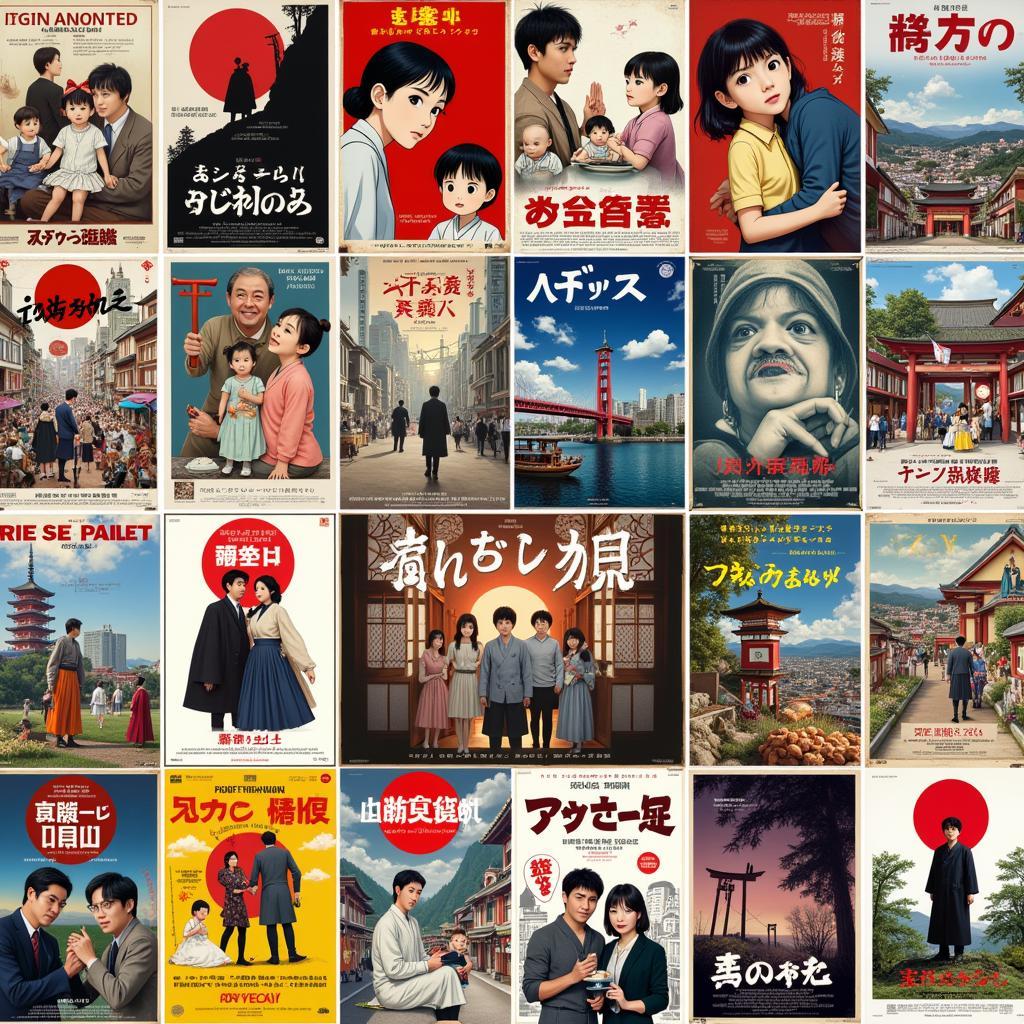Japanese society movies offer a captivating lens through which to understand the country’s rich culture, complex social dynamics, and evolving values. From classic samurai films to contemporary anime, cinema provides a powerful medium for exploring the nuances of Japanese life, both past and present. This article delves into the fascinating world of Japan Society Movies, examining their impact and exploring key themes they often portray.  Japanese Society Depicted in Film
Japanese Society Depicted in Film
Unveiling Cultural Nuances Through Cinema
Japanese cinema has a long and storied history, reflecting the nation’s unique cultural identity. Films often explore themes of honor, duty, and family, deeply rooted in traditional Japanese values. They provide insights into the complexities of interpersonal relationships, societal expectations, and the challenges faced by individuals navigating a rapidly changing world. For example, the film Tokyo Story (1953) offers a poignant portrayal of family dynamics and the generational gap in post-war Japan. Similarly, Shoplifters (2018) examines the meaning of family in a contemporary context, challenging conventional notions of kinship and belonging.
The Impact of Japanese Society Movies on Global Audiences
Japanese films have captivated audiences worldwide, introducing them to the intricacies of Japanese culture and sparking cross-cultural dialogue. From the visually stunning works of Akira Kurosawa to the thought-provoking animations of Studio Ghibli, these movies have broadened global understanding of Japan and its people. They offer a window into different ways of life, fostering empathy and appreciation for cultural diversity.  Global Impact of Japanese Cinema
Global Impact of Japanese Cinema
Common Themes in Japanese Society Movies
Several recurring themes emerge in Japanese society movies, providing valuable insights into the country’s social fabric:
- Family Dynamics: The family unit plays a central role in Japanese culture, and films often explore the complexities of family relationships, intergenerational conflicts, and the changing roles of family members in modern society.
- Social Hierarchy and Conformity: Japan has a hierarchical social structure, and movies often depict the pressures to conform to societal expectations, the challenges of navigating social hierarchies, and the consequences of deviating from established norms.
- Urban vs. Rural Life: The contrast between urban and rural life is another prevalent theme, highlighting the cultural differences, economic disparities, and social challenges faced by individuals in different environments.
- Gender Roles and Expectations: Japanese films often explore the evolving roles of women in society, challenging traditional gender expectations and depicting the struggles faced by women seeking equality and autonomy. impact of movies on society
How Japanese Society Movies Reflect Social Change
Japanese cinema has served as a powerful platform for reflecting and commenting on social change. From the post-war period to the present day, movies have captured the evolving values, shifting social norms, and challenges faced by Japanese society. They provide a valuable historical record of the nation’s transformation and offer insights into the ongoing debates surrounding social issues.
What Are Some Must-See Japanese Society Movies?
If you’re looking to delve deeper into Japanese society through film, here are a few must-see recommendations:
- Seven Samurai (1954): A classic samurai film that explores themes of honor, duty, and social responsibility.
- Tokyo Story (1953): A poignant portrayal of family dynamics and generational differences in post-war Japan.
- Spirited Away (2001): An animated masterpiece that explores themes of identity, courage, and cultural exchange.
- Shoplifters (2018): A contemporary drama that challenges conventional notions of family and belonging. the black cat society, red cross society of china
In conclusion, Japan society movies provide a compelling and insightful way to understand the country’s rich culture, complex social dynamics, and evolving values. They offer a window into the lives of ordinary people, exploring universal themes of family, identity, and social change. By engaging with these films, we can gain a deeper appreciation for the nuances of Japanese society and its contributions to global cinema. asian secret society crossword
FAQ
-
What are some common themes in Japanese society movies? Family dynamics, social hierarchy, urban vs. rural life, and gender roles are common themes.
-
How do Japanese movies reflect social change? They capture evolving values, shifting norms, and societal challenges.
-
Who are some influential Japanese filmmakers? Akira Kurosawa, Hayao Miyazaki, and Hirokazu Koreeda are just a few.
-
Where can I watch Japanese society movies? Streaming services, DVD rentals, and local film festivals often feature Japanese cinema.
-
Why are Japanese movies important for cross-cultural understanding? They offer insights into different ways of life, fostering empathy and appreciation for cultural diversity.
-
What is the significance of samurai films in Japanese cinema? They explore themes of honor, duty, and the samurai code, reflecting traditional Japanese values.
-
How has anime influenced global popular culture? Anime has become a global phenomenon, influencing animation styles, storytelling, and character design.
Need further assistance? Contact us at Phone: 02043854663, Email: [email protected] or visit our office at Zone 34, Bac Giang, 260000, Vietnam. We have a 24/7 customer support team ready to help.